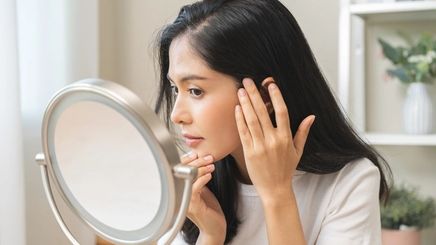
If you’re often battling deep, ultra-inflamed zits around your chin and jawline, you may need to look deeper into the problem. Medical conditions like Polycystic Ovary Syndrome (PCOS) can throw your hormones off balance, triggering painful breakouts. So, how do you differentiate regular pimples from PCOS acne?
What Is PCOS?
PCOS is a common condition affecting around , yet it’s still something of a medical mystery, even to experts. There isn’t a single definitive cause behind this hormonal condition, but usual culprits include genetics, insulin resistance, or higher levels of androgens produced in the ovaries. These lead to a cascade of events, including irregular menstruation, excess facial and , , weight gain, and (you guessed it) acne.
PCOS symptoms don’t look the same in everyone, and unfortunately, the signs are often misdiagnosed or dismissed as nothing more than “an abnormal phase.” If you check off two or three of these boxes, it’s worth getting tested and seeking help from a medical professional.
PCOS Acne vs. Regular Acne
There are subtle yet significant distinctions that set PCOS acne apart from the old-fashioned pesky bumps. The most common contrast is the pattern. usually worsen around the time of your period. Plus, the flare-ups tend to pop out in the same area every month.
While PCOS acne typically appears on the lower half of the face (cue pimples on the chin), breakouts can also occur along your neck, back, and chest. The excess androgens can signal your skin to produce more oil and decrease cell turnover. According to the , the overproduction of these hormones also aggravates existing acne because they change the type of oils your skin makes (sebum lipid profile).
The shape of your pimples can also clue you in on what’s happening behind the scenes. Those surface-level raised spots (papules) and red dots with visible yellow pus on the heads (pustules) are not in the same realm as PCOS-related inflammation, which manifests as hormonal . The latter are larger and deeper, and more likely to leave scars.
How to Care for PCOS Acne
When it comes to treating PCOS, the consensus among experts is to curb the symptoms as best as they can. If you’re diagnosed with the condition, your doctor may prescribe hormonal birth control to regulate your menstrual cycle and testosterone-blocking medications to decrease sebum production.
Meanwhile, you can level up your skincare game to tackle PCOS acne head-on. Here are some tips to help you get the skin of your dreams.
Gentle cleansing is key.
Your skin may feel oily but resist the urge to overwash your face. Harsh cleansers can disrupt the skin's pH balance, potentially triggering more breakouts. Choose a gentle formula that removes impurities without stripping your skin dry. You can also pick one with to help clear your complexion and reduce the risk of .
Strengthen your skin barrier.
Since PCOS wreaks havoc on your hormones, your body can undergo many changes. Besides oiliness, women with PCOS can also experience , which prompts the sebaceous glands to . In this case, pump up the hydration to strengthen your , especially if you’re using active ingredients in your routine.
Look for products that help hydrate the skin and soothe inflammation, such as Eskinol Pimple Relief Serum with Korean cica and extracts. It also has niacinamide to brighten dark and salicylic acid to exfoliate dead skin cells. Clear pores mean fewer breakouts!
Use a spot treatment.
Spot treatment is the solution for busting pimples. It delivers potent ingredients right where they are needed – killing bacteria, unclogging pores, and getting rid of excess oil. Look for products with benzoyl peroxide or like Eskinol Pimple Relief Spot Gel Corrector, which zaps pimples overnight. It combines the power of skin-calming cica, green tea, and niacinamide to reduce redness and prevent the skin from drying out.
Hands off your face.
We know how tempting it is to pop PCOS acne but trust us when we say it never ends well. When you touch your face, you transfer germs from your hands. These unwelcome dwellers immediately set up a camp on your skin, causing more pimples. Therefore, wash your hands regularly, especially before doing your skincare routine. Don't forget to clean your , sponges, and pillowcases, too!
PCOS acne doesn’t have to be permanent. Don’t give up on your journey towards clearer skin. With time, patience, and advice from your doctors, you'll find a skincare routine that works for you.